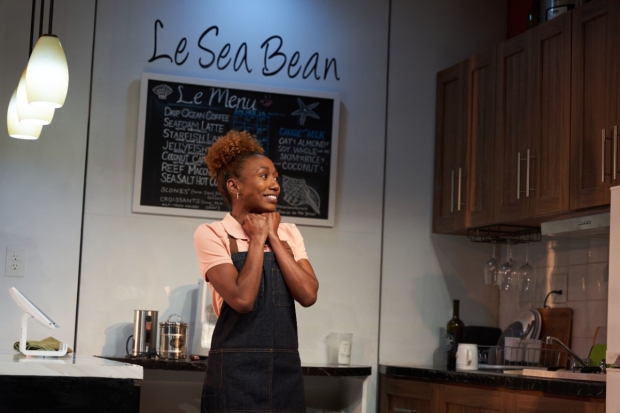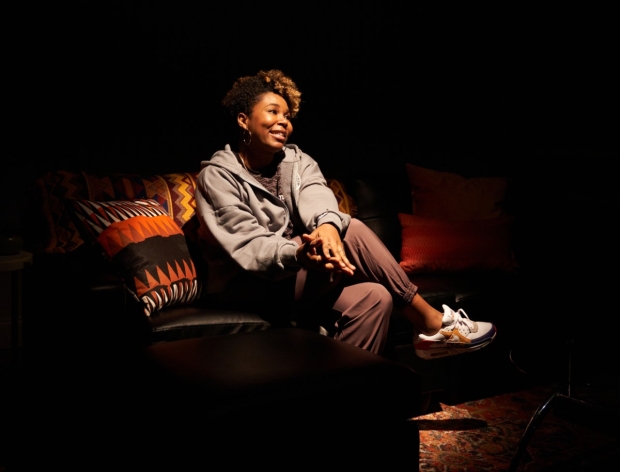Review: La Race Turns Gentrification Into a New York Dramedy

(© Daniel J Vasquez)
The first rule of any effective political campaign is to have a clear mission statement. A play doesn't benefit from quite as much tunnel vision, but La Race — Bleu Beckford-Burrell's latest addition to her End of the Line Anthology of plays about life in Far Rockaway — could take some cues from its electioneering characters and streamline its message.
Now running at WP Theater in a collaborative production from Page 73 and Working Theater, La Race takes on a laundry list of issues — from gentrification to local politics to interracial relationships to mental health. With direction by Taylor Reynolds, the play shows a clear effort from Beckford-Burrell to weave its naturally interlacing characters and subjects into a tapestry that draws out the nuances of this particular New York community. Fluidity, however, is what La Race lacks, forcing each component to rigidly line up side by side and accumulate a mountainous two-and-a-half-hours of content with no clear summit.
The centerpiece of the play is a 2017 political campaign. Thirtysomething Maxine (Naomi Lorrain, giving a strong, anchoring performance), a Black woman who was recently fired from her personal-assistant job under mysterious circumstances, is coaxed by her best friend, roommate, and born speechifier AJ (Shaunette Renée Wilson filling the space with alternatingly lovable and despotic energy) to use her suddenly empty schedule to run for city council. Maxine makes it clear that she has no political aspirations of her own — and based on glimpses into her therapy sessions, she may not be in the right head space for such a big undertaking. Even so, AJ, a closeted lesbian, sees Maxine as the broadly acceptable mouthpiece she needs to make her staunchly progressive (and rather hard-nosed) values heard in her community.

(© Daniel J Vasquez)
Aside from the explicit racism and bigotry we can only imagine is floating through the air (given the year in which the play is set), Maxine and AJ's main point of concern is gentrification, embodied by the neighborhood's latest overpriced coffee shop, Le Sea Bean. All their feelings of anger, betrayal, and subjugation are wrapped up in this establishment's $13 lattes and the bougie white folks who frequent it. And yet, this belly of the beast is not only where Maxine meets and strikes up a relationship with a white man named Grant (Vince Nappo, giving a performance that leaves just enough space between charm and condescension), but it also becomes a prime campaigning spot, with Le Sea Bean's open-mic nights offering a platform for some of Maxine's most personal poetry (not to mention some of Beckford-Burrell's most energizing writing).

(© Daniel J Vasquez)
La Race's greatest strength is its rendering of the messy contradictions that accompany conviction, let alone political conviction and all the hypocrisies that come with that. These dramatically rife confusions, however, are undermined by general theatrical confusions of tone and story. Drama is clunkily mixed with farcical TV-style comedy at every turn: Trey (an admirably grounded Christopher B. Portley) takes on the role of intrusive next-door neighbor, while also figuring out how to launch a campaign as AJ's right-hand man (his acumen with campaign research bafflingly does not spill over into a cognizance of AJ's sexual proclivities). Haitian immigrant and Sea Bean employee Uriel (Auberth Bercy, with an overzealous French accent) becomes the play's wise fool, popping up at every locale in another work uniform with a cheerful attitude and a pithy comment. And Dejani (Stacey Sargeant), a campaign volunteer with an expunged felony charge, becomes a well of legal jokes, though she manages to stay on the right side of the sitcom line with a compelling arc about her parental custody battle.
Meanwhile, the characters claiming to be set upon by gentrifiers live much like the gentrifiers themselves (perhaps Beckford-Burrell's intent, but one that goes woefully unexplored). Set designer Arnulfo Maldonado crafts Maxine and AJ a shiny apartment that is fit for a Home Goods cover and seemingly impenetrable to financial stressors. The newly unemployed Maxine has no qualms about going without a paycheck for the duration of the campaign, nor has any concerns about the price tag of therapy (Sargeant unnecessarily doubles as her therapist in select scenes). And from the little we learn of her, AJ seems to be a perpetual student with wealthy parents whom she hopes to solicit for a substantial campaign donation. In that dynamic alone is a fascinating play about the intersection of race, class, wealth, and privilege. But with all the ancillary hubbub, La Race can't quite reach the finish line.

(© Daniel J Vasquez)











